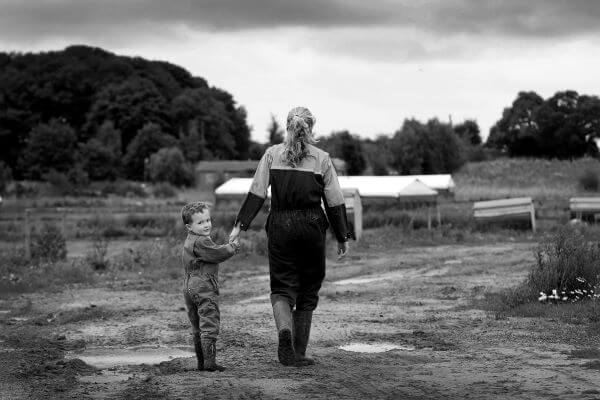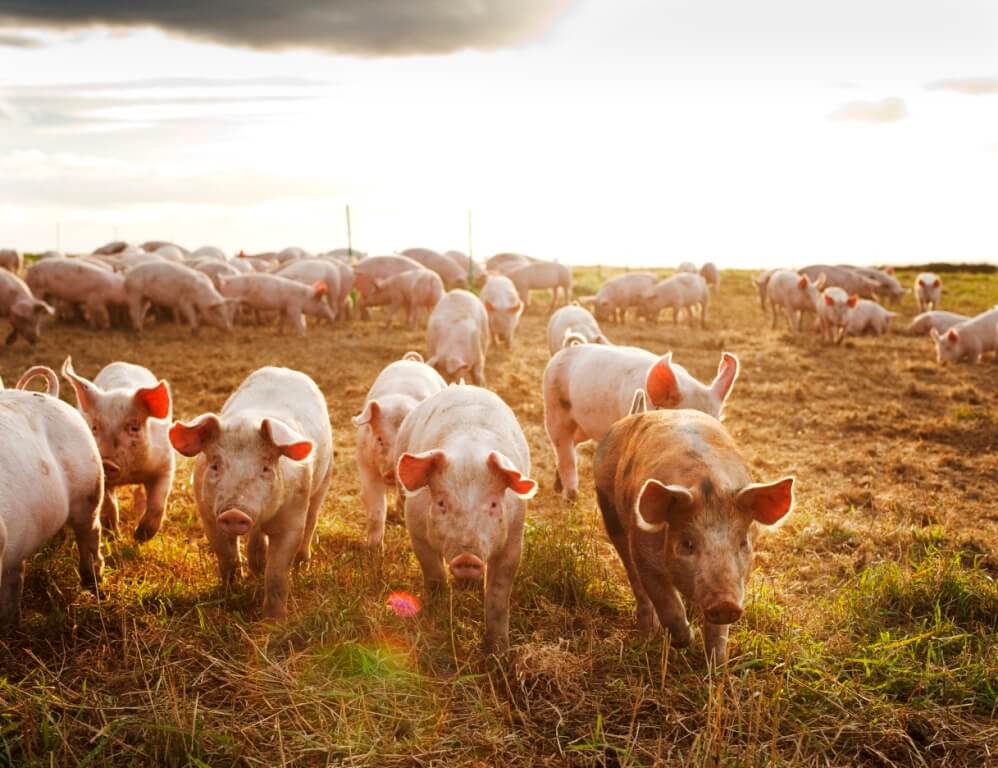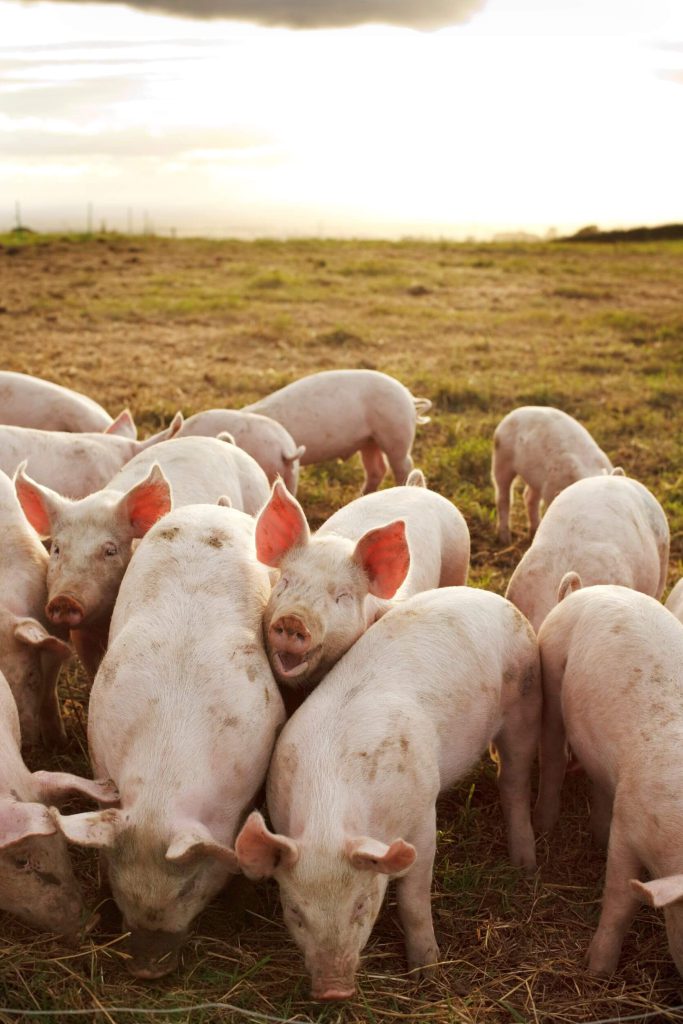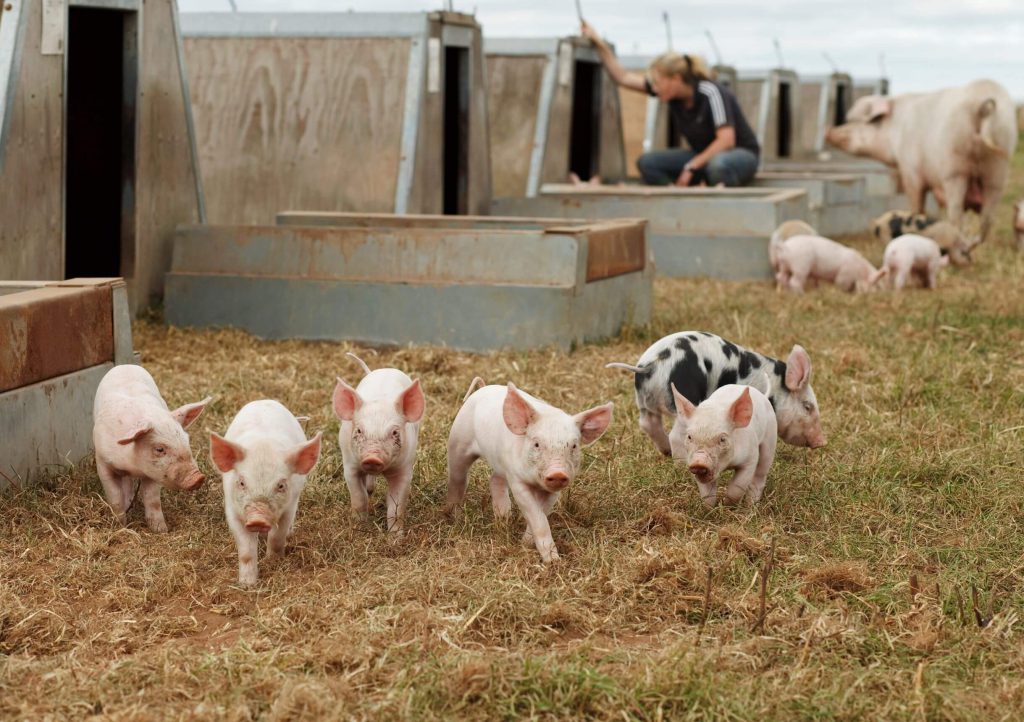Anna’s Happy Trotters – Back British Farming

As part of our campaign to Back British Farming we sit down with farmers on our rural community blog, and chat about all things farming. In this blog we spoke with Anna Longthorn (@annas_happy_trotters), who is an English farmer. Anna helped us understand the farm she works on, how she came to be a pig farmer, the farming tradition in her family and the opportunities she sees for others wanting to enter farming…
Our family have both arable and pigs. I’ve always worked on the pigs on and off since being at school and 14 years ago built my own business buying weaned pigs from the family farm, growing them on myself free range and selling them under the brand “Anna’s Happy Trotters, Yorkshire Free Range Pork”. This includes full carcasses which go out to wholesalers, butchers and farm shops but also includes a butchery enabling us to sell all cuts of pork as well as dry cured gammon and bacon, sausages and burgers to restaurants, cafes and shops, as well as through our own retail outlet and café “Anna’s Happy Kitchen”. We also have an online shop and courier out product nationwide.
I grew up on the farm, originally arable and mum added pigs to the mix when I was round about 7-8. I was immediately drawn to them, being interested in animal behaviour – far more interesting than looking at a field full of crops! I spent my Summers working on the pigs, then after A-Levels and another summer of working on the pigs as well as waitressing on evenings/weekends, I saved up enough money to take my gap year. I travelled to Australia, working on a holiday farmstay teaching visitors to ride horses (also teaching Australians how to crack a whip and throw a boomerang, make billy tea and damper which was rather bizarre!) I showed them round the small farm attraction, milking the cow, tractor rides, etc. I also worked on a large cattle station in outback Queensland, rounding up cattle on horseback & motorbikes and performing general farm tasks. The family I stayed with there were well into their campdrafting, so I was lucky enough to go to Campdraft events and rodeos every weekend!
When the year was up I came back to go to Uni to study Sports Science – farming wasn’t encouraged as a career back then at the school I went to. It was absolutely the ‘done thing’ that everybody was to go to Uni, so I chose sports science as I was into sport and played tennis, hockey, netball and rugby to a reasonably high level. Uni definitely wasn’t for me with just ten hours of lectures per week I found myself incredibly bored, itching to get back to work, so dropped out and went back to Australia for another 3 years and worked back on the holiday farmstay I’d forged a good relationship with.
After that three years I realised it really was time to decide what I wanted to do with my life and whilst Australia was great, it wasn’t a lifelong option in terms of Visas, etc.
So I came back to the UK, back to the family farm, but still dad encouraged me to try other things, not wanting me to feel like I had to follow him into farming, same as he did with my brother (which didn’t work on him either), so I retrained as a tennis coach. I coached for around two years but that didn’t quite feel right and again found myself back on the family farm with the pigs, where Dad had just started producing our pigs fully free range for the particular contract he was on. Prior to this all the pigs we produced were outdoor bred so bred outside, reared in straw yards. So my job was running our new free range fattening site.
However, just two weeks into drawing pigs from this free range site, the customer dad had the contract with decided that there wasn’t a market for this premium product and that contract would come to an end. Having invested heavily in outdoor accommodation setting up this free range site and personally believing in it we saw an opportunity to market our product under its own brand and create a more direct supply chain, this is where Anna’s Happy Trotters was born. The name found by running a competition in the local Junior school with the chosen suggestion winning a leg of pork!
And the rest, as they say, is history.
We now sell around 150 pigs (all gilts) per week be it either as full carcass or processed through our butchery. Another sideline we have is hog roasts for events.
I don’t remember consciously “deciding” to be a farmer, more just accepted that it was in the blood having found myself back on the farm time and time again!
I think you have to have a distinct love for the job. As you’ll hear a lot, you wouldn’t farm unless you loved it. The hours can be long, the responsibility huge, but I think most farmers will tell you it is in the blood and it is a life, not a job. At the end of the day farming is a business, just like any other, and in order to survive you literally have to give it everything you have, live and breathe it.

I grew up on the farm so had the experience from a whole fountain of knowledge over the years from people that have been in the industry years before me, amazing vets and allied industry, but as I said before it is a business like any other and so having studied Business Studies at A-Level certainly helped. Having a love of food and cooking has helped in my personal business being a real farm to fork affair. Associations like Deliciously Yorkshire and FRA running various courses over the years have helped and gaining knowledge from similar businesses – a lot of people are willing to pass on their experience. And going on a DBL (Developing Business Leaders) pretty intense and extensive course with Cedar Associates quite a few years ago was and still is without doubt, the best thing I could have done for my career, not just the course itself and the content within but “chewing the fat” with other business leaders.
I have a son Richard, 9, and am a single mother and so obviously run a home as well along with two Australian Kelpie dogs. I have a hugely supportive mum and dad who help me enormously, and a very understanding team around me who understand my personal circumstances and are very understanding and accommodating, acknowledging that in school holidays there’s going to be an extra pair of hands on the farm/ in the café that they might need to work with/around! Because of this Richard also has some amazing male role models which otherwise he might not have. Whilst some might think this would be quite hard Richard is an absolute delight, he helps out on the farm in holidays and I have just one child to look after rather than a child and a husband! Only two mouths to feed rather than three, only two lots of washing rather than three….the list goes on. We know what we’re doing and just get on with it and it works. Although the diary does have to be ridiculously organised!
What does a typical day look like? Every day is so varied because of the nature of my business and the various elements to it, I might be out on farm vaccinating weaners, or I could be delivering meat out for the butchery, or I could be running around at the café…or I might be in the office (yawn) catching up on admin or putting together content for social media/working on marketing “stuff”. There really isn’t a typical day, especially given the challenges over the last couple of years with Covid, etc. we have had to be incredibly dynamic and react to the moving goal posts. But this is one of the reasons I enjoy (mostly!) what I do.

I’ve had little time off over the last couple of years but during Covid I found myself very fortunate that we could just carry on as key workers (apart from closing the café). And then with the pig backlog over the last year and the challenges that’s thrown up, and more latterly the abattoir that we’ve used for years closing down has meant yet more challenges to overcome and logistics to sort, then the summer being the season of hog roasting and people reorganising events from the last couple of years that’s had all the weekends tied up! I could of course have turned some of these down but with the pig industry being the way it has been over the last year and hog roasts being a more lucrative part of what we do (I have joked the only way of actually making money out of pigs over the last year) it’s not something I’ve wanted or felt able to turn away!
When I do get time off it’s very much about spending time with Richard but I suppose living “on the job” it’s very easy to get dragged back in to work to just do this or just do that, but fortunately Richard enjoys helping out – be it on the farm helping with the pigs or washing up at the café. Around a year ago I bought a kamado BBQ which has become quite a passion and something I’ve found very cathartic….and also provides good social media content for recipe ideas and marketing our products! Always handy to have a passion that kills two birds with one stone, or in this case three – 1. Need to eat. 2. Gives marketing content. 3. Destresses me!
I find farming great because obviously it’s a pleasure to work with animals. It’s a real sense of achievement seeing where we started in terms of set up and where we are now and the technological advances and a whole host of other improvements in terms of set up and lay out and just how much things have moved on. I don’t think that’s always acknowledged outside of farming just how far it’s come over the years, much like any other industry and it’s very satisfying. And the people in the industry are great too be it farming colleagues or allied industry. I suppose because the pig industry is relatively small a lot of us know each other and are willing to share knowledge and ideas and are also incredibly supportive of each other when the chips are down, much like over the last year.
Let’s be honest, it’s been bleak, and mentally very testing, but having the understanding of others in the industry and the support of allied, unfortunately not the main processors or retailers obviously, but just that support has meant a huge amount. It’s just unfortunate that mental support doesn’t pay the bills! Hopefully the supply chain review into the mainstream supply chain will address this and lead to a much fairer and transparent supply chain moving forwards. Working with like minded people that share your values in terms of animal welfare and empathy with the animal that not everyone understands is a real pleasure and automatically means you’re working towards a common goal.
The main challenge for certainly the pig industry is the huge cost of production and we can’t see that falling any time soon. But on top of that what has always been a challenge is the unlevel playing field we operate in with various government departments not working towards a common goal. We have DEFRA strapping more and more standards on in terms of welfare and environment, which is fine – we want high standards. But when we wave in imports that do not meet those same standards, it is completely at odds with what DEFRA are trying to achieve and makes it completely unfair for British farmers. And it has always been the case!

Labelling has always been a challenge too with consumers seemingly having to be detectives to work out if a product is produced in the UK, with fake farm names/tertiary brands in supermarkets to some butchers shops and farm shops taking advantage of the fact that consumers will automatically assume that product sold in a farm shop will be local or at least British but this isn’t always the case. Far more legislation is needed in terms of country of origin labelling to make for a level playing field for the farmer and to allow consumers to easily buy British if they wish. If we can put allergen information and nutritional value on products then at the very least we can put COO on including in restaurants, cafes, etc.
I’ve always felt supported by colleagues in the industry and by family and various associations, never felt supported by government sadly!
I’ll always promote farming as an industry to get in to – even after the last year! Everyone needs to eat. But I think you need to go in with your eyes wide open and accept it’s not a Monday to Friday 9-5. There’s some amazing opportunities in allied industry too and so many different roles and opportunities within. There are some really great and passionate people in the industry to learn from and to aspire to. What’s always frustrated me is that farming isn’t promoted as a career to get into at school, and that’s probably because we don’t learn enough about food production at school, and with it being such a fundamental part of life it really should be in the school curriculum.
I think there are many assumptions made about farming that it’s just driving around in a tractor all day or shovelling the proverbial and people don’t necessarily see how much it has moved on over the years in terms of technological advancement and the intelligence required for farming! And that includes politicians and teachers. I think they’re perhaps afraid to admit they don’t know how food is produced (commercially) nor ask the questions for fear of embarrassment simply because the perception is that there’s not a lot to it but this couldn’t be further from the truth. And I think it’s our job as farmers to try to educate and promote ourselves, which I think thanks to social media we’re getting better at, but there’s still a very long way to go.
The opportunities are endless if the eyes are open and there is a willingness to explore. Like I said before, we’re always going to need to eat! The farming sectors are diverse in terms of skill sets for the various livestock and arable and then allied associated industries – so many opportunities as well as crossovers, for example vets. I imagine most people studying veterinary science go into it thinking they’ll go into small animals but the opportunities are huge for vets be it large animals on farm or in abattoirs or for export or pharmaceuticals. There’s so many different avenues that can be taken and training / retraining opportunities within.
If you’re a farmer and you’d like to contribute in our campaign to raise awareness for the incredible work in British agriculture, please drop us a DM on Instagram – @aplanrural







